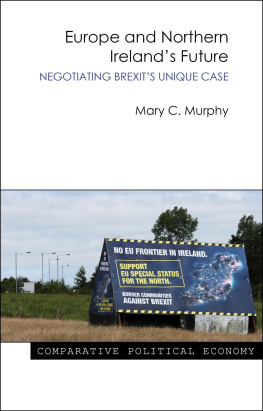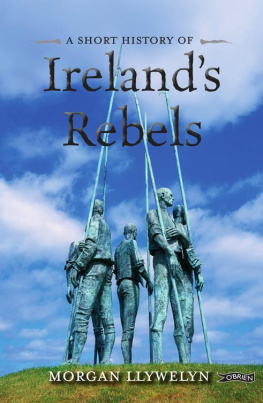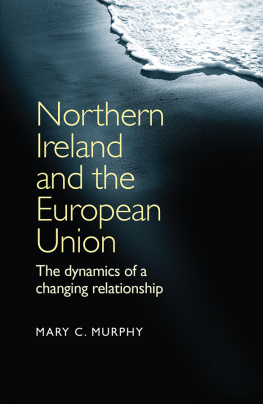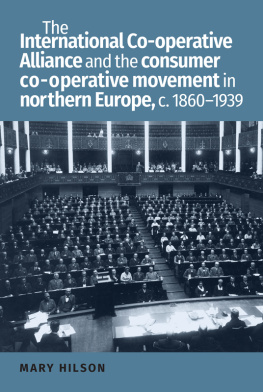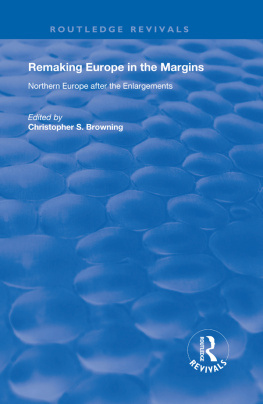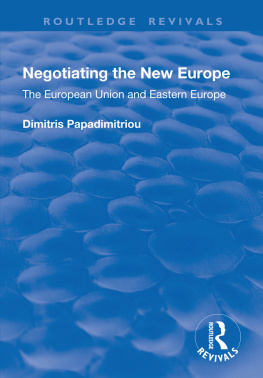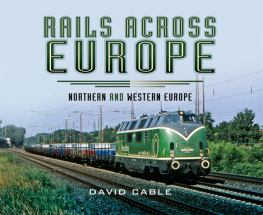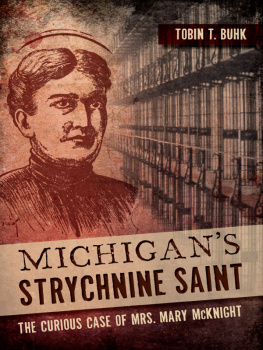Comparative Political Economy
Series Editor: Erik Jones
A major new series exploring contemporary issues in comparative political economy. Pluralistic in approach, the books offer original, theoretically informed analyses of the interaction between politics and economics, and explore the implications for policy at the regional, national and supranational level.
Published
Europe and Northern Irelands Future
Mary C. Murphy
The New Politics of Trade
Alasdair R. Young
Europe and Northern Irelands Future
Negotiating Brexits Unique Case
Mary C. Murphy
For Paul
Mary C. Murphy 2018
This book is copyright under the Berne Convention.
No reproduction without permission.
All rights reserved.
First published in 2018 by Agenda Publishing
Agenda Publishing Limited
The Core
Science Central
Bath Lane
Newcastle upon Tyne
NE4 5TF
www.agendapub.com
ISBN 978-1-78821-029-4 (hardcover)
ISBN 978-1-78821-030-0 (paperback)
ISBN 978-1-78821-112-3 (ePub)
British Library Cataloguing-in-Publication Data
A catalogue record for this book is available from the British Library
Typeset by Swales & Willis, Exeter, Devon, UK
Printed and bound in the UK by TJ International
Contents
My academic career started with a PhD thesis that documented and analysed Northern Irelands relationship with the European Union. The choice by the UK to leave the European Union marks the final stage of that relationship in its current form. This book was motivated by the EU referendum decision, and inspired by a belief that despite considerable challenges and given certain conditions, this momentous decision can strengthen rather than undermine Northern Irelands post-conflict journey.
The research that informs the content of this book was gathered in a number of ways: on a one-to-one basis, at workshops and conferences, and during Chatham House events. Contributions from civil servants, politicians, journalists and stakeholders were hugely important and valuable. Their input and insights helped to enhance the depth and quality of this study. I hope that the final published product repays them with some useful ideas and analysis.
Brexit is, of course, a moving target. While proposals and agreements will be mooted and proposed over the course of the months and years to come, their feasibility and their acceptance or rejection will be determined by the issues covered in this book. The European Commissions Draft Withdrawal Agreement published in February 2018 is not addressed here, and there will be further documents and developments which will either advance or damage the prospects for an orderly Brexit. This book anticipates these developments and provides a frame of reference within which they can be best understood and assessed.
My thanks to academic colleagues in University College Cork and elsewhere who shared their thoughts and assessments with me. Their input was invaluable and has lent greater rigour to the work. Engagement with academic friends also helped to make the research process enjoyable! The students I have met and taught over the years also (inadvertently) contributed to framing my research. Friends in Cork were hugely supportive too.
I am immensely grateful to the team at Agenda Publishing, particularly Alison Howson, for her extraordinary patience and support. There is no better gift than a dedicated and enthusiastic editor and Alison offered this and more. I am also thankful to the anonymous reviewer and series editors who provided helpful and constructive feedback and advice.
A word of thanks to my parents and family for their permanent support and unrelenting interest in my work. A particular mention for my brother Declan who is always an inspiration. A final thank you to my best friend, my husband Paul. He knows more about Brexit than he may ever need or wish to know! Through it all, his love and support has been unfailing.
Mary C. Murphy
Cork
The lesson that we learned from Britains 2016 referendum on the European Union is that European integration is experienced differently in different places. This is obviously true across countries, and always has been the case. The British referendum revealed the extent to which such distinctiveness is also true within member states. The British vote was surprising because of the concentration of support for membership in the European Union in places like London, Oxford and Cambridge. It was also surprising for the concentration of desire to leave the European Union in many parts of Britain outside of those major cities. There were of course important exceptions. Scotland and Northern Ireland were most prominent among these. And, in the immediate aftermath of the vote, there was considerable concern that Scots might take advantage of the difference in attitudes to push for another referendum on independence. That seemed to be the most potent source of division within the United Kingdom.
What few observers recognized at the outset, however, were the full implications of the Northern Irish case. To say that Northern Irelands relationship with European integration is distinctive is an understatement. The Northern Irish peace process was framed by European Union membership both for Ireland and for the United Kingdom. In the two decades that followed the Good Friday Agreement, the people of Northern Ireland grew accustomed to being able to interact freely both with the British and with the Irish economy thanks to this European Union membership.
The decision of the British people to leave the European Union threatened much of this new freedom. In doing so, and inadvertently, that decision also threatened the post-conflict stabilization of Northern Ireland. This potential disruption was difficult to appreciate for any but the closest observers of Northern Irish politics. Even within the British government, the distinctive position of Northern Ireland relative to European Union membership was under-explored. This became all the more true in the aftermath of the May 2017 British general election. When the Conservative Party chose to form a minority government with the support of the Northern Irish Democratic Unionist Party, it inadvertently raised the prospect that the interests of one group within Northern Ireland might be privileged by this new government, perhaps even over the stability of the Northern Irish peace process.
This prospect of weakening the implementation of the Good Friday Agreement became particularly important in the negotiation of trade relations and regulatory convergence between the British economy and the European Union. At issue was the necessity for having a hard border between Northern Ireland and the rest of Ireland as a result of Britains desire to exit from the single internal market of the European Union. The reason this might be so is something that we explored already in this series in the book The New Politics of Trade , by Alasdair Young. The new politics of global trade takes place deep beyond national borders; if that politics is rejected, then only strong national borders can provide the kind of safeguards necessary to ensure that goods passing from one market to the next meet the essential regulatory requirements. Hence even if no one declares a goal of introducing a hard border between Northern Ireland and the rest of the island or, indeed, between Northern Ireland and the rest of the UK such a border might be a necessary consequence of how the negotiations between Great Britain and the European Union play out.


